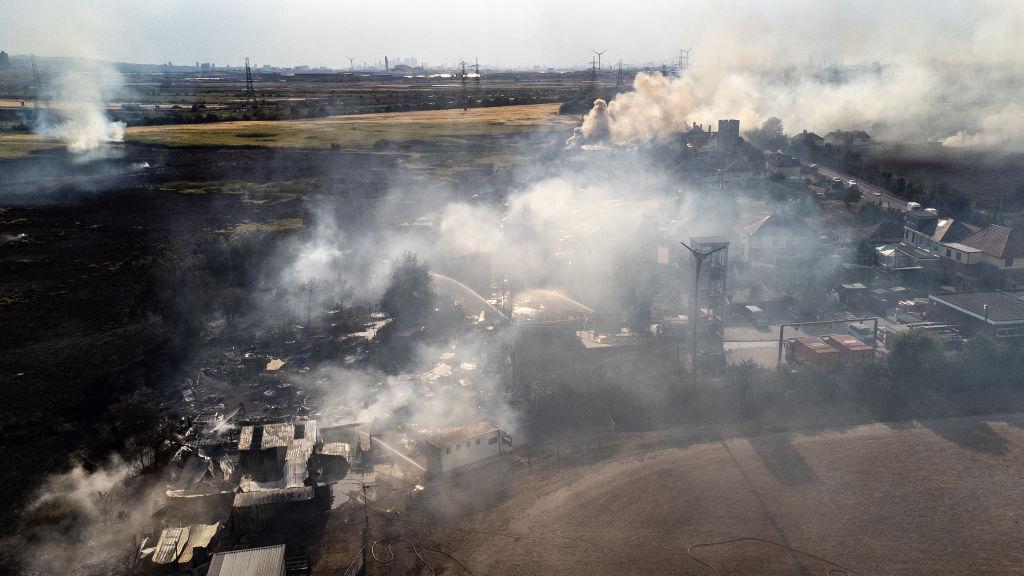Heatwave: Fewer commuters as London swelters in hottest day of year
- Published
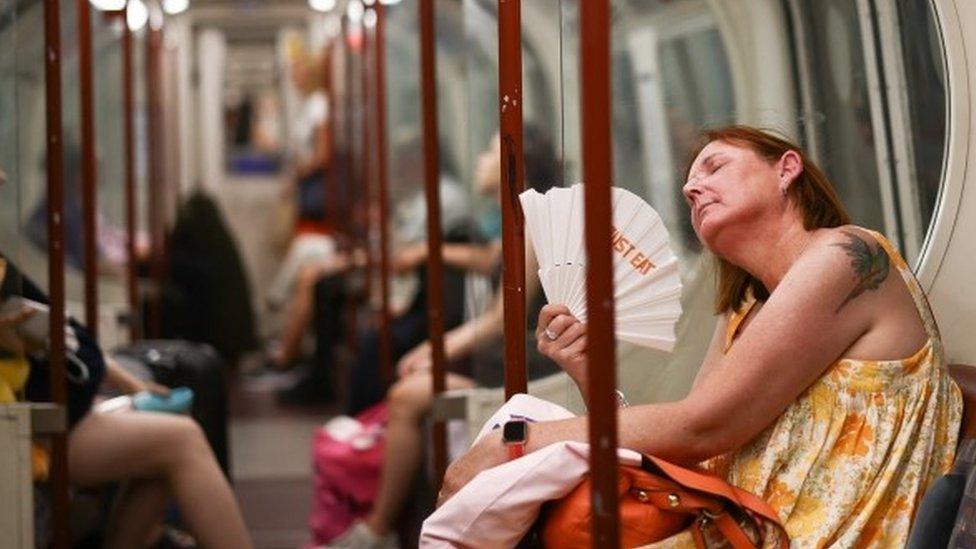
Underground trains have temporary speed restrictions due to the heat
Fewer people have used public transport in London as commuters heeded warnings to avoid travelling on is the hottest day in the capital this year.
An unprecedented red alert is in force as the Met Office predicts temperatures could top 40C (104F) this week. The current record is 38.7C (101.7F).
By 15:00 BST, Kew Gardens in west London was the hottest place in England having reached 37.5C (99.5F).
Transport for London (TfL) has urged people to travel only if essential.
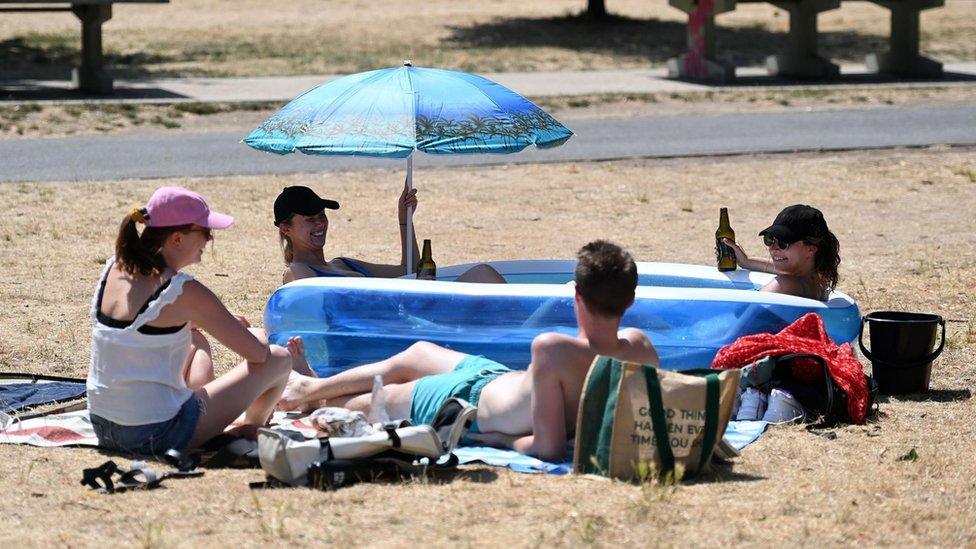
Some people have taken to London's parks
Figures released by TfL showed that by 10:00, 1.06 million entries and exits had been made on the Tube, a drop of 18% compared to last Monday and about 50% of pre-pandemic demand.
About 1.07 million bus journeys had been made by the same time - down 10% on last Monday and at 81% of the pre-pandemic level.
To help the track cope with the heat, trains are running at a slower speed.
This has caused:
The Hammersmith & City Line to not run
London Overground has no service between Romford and Upminster and between Willesden Junction and Richmond
The Metropolitan Line has no service from Baker Street to Aldgate
Severe delays on the Bakerloo, Central and District lines and London Tramlink
Fewer mainline trains than normal on most lines into London
The cable car has been suspended due to the heat.
Allow X content?
This article contains content provided by X. We ask for your permission before anything is loaded, as they may be using cookies and other technologies. You may want to read X’s cookie policy, external and privacy policy, external before accepting. To view this content choose ‘accept and continue’.

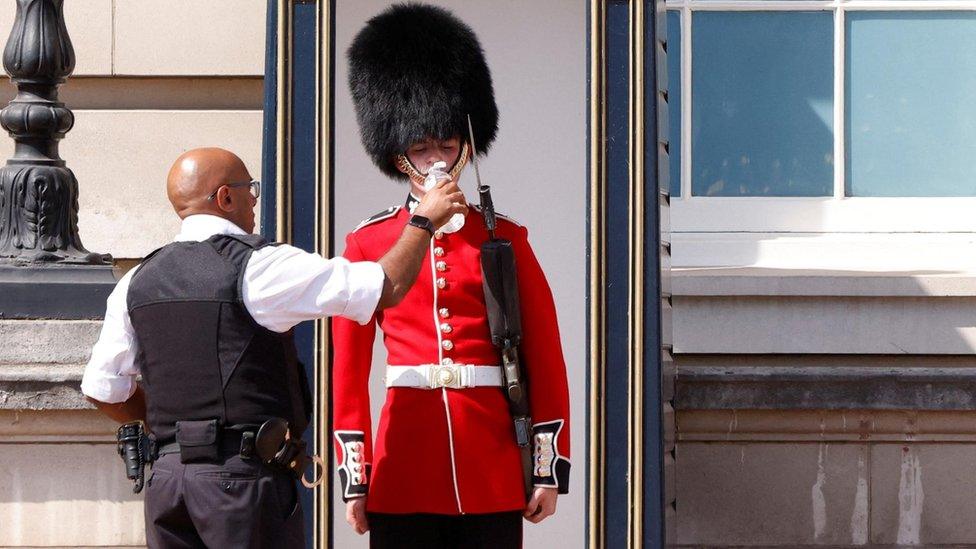
Analysis: Pallab Ghosh, BBC News science correspondent
Large urban areas tend to be warmer because there is relatively little bare earth and vegetation and a high concentration of man-made materials which absorb heat, rather than reflect it.
This phenomenon is known as an urban heat island and while heat generated by transport can contribute, the reflection of the sun off windows does not.
As London has the largest urban sprawl it tends to have record high temperatures.

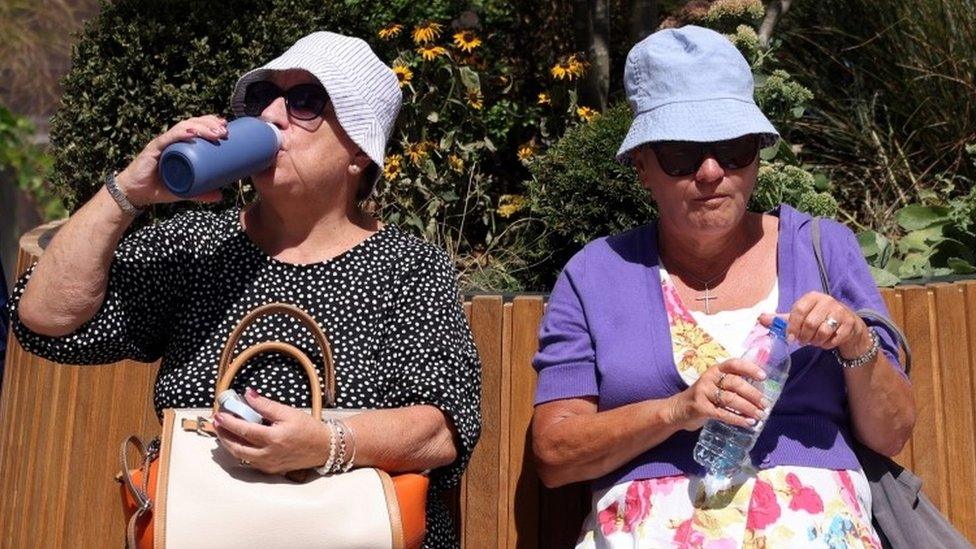
People have been urged to drink lots of water
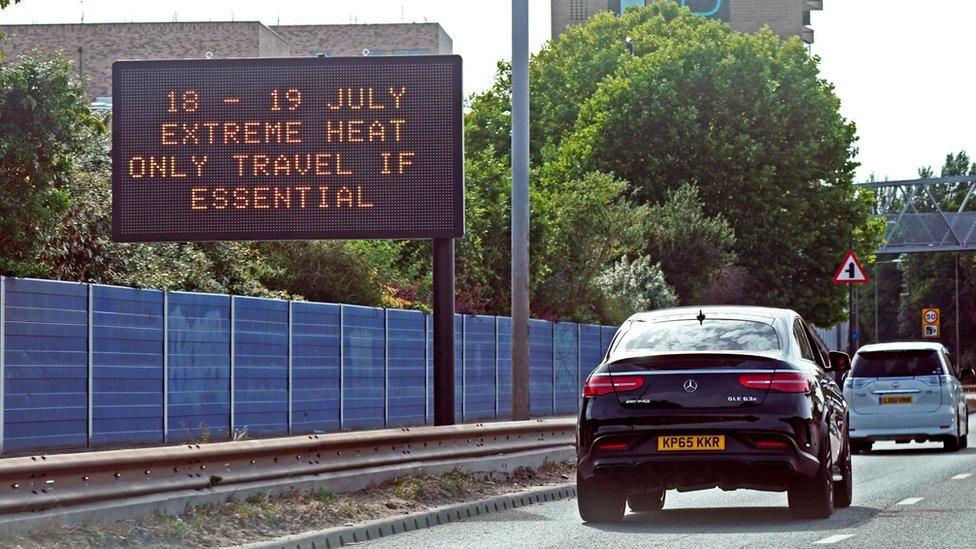
The heatwave is expected to last throughout Monday and Tuesday
Away from travel, Affinity Water, which serves some parts of London, said it was experiencing lower pressure levels and urged consumers to avoid non-essential usage.
It predicted an extra 164 million litres of water would be needed on Monday compared to normal demand.
"Because of the hot weather, many of us are using much more water," the provider said.
"This means you may notice lower pressure or no water when demand is higher in your area."
Thames Water has also said demand for water is "at a near-record level".
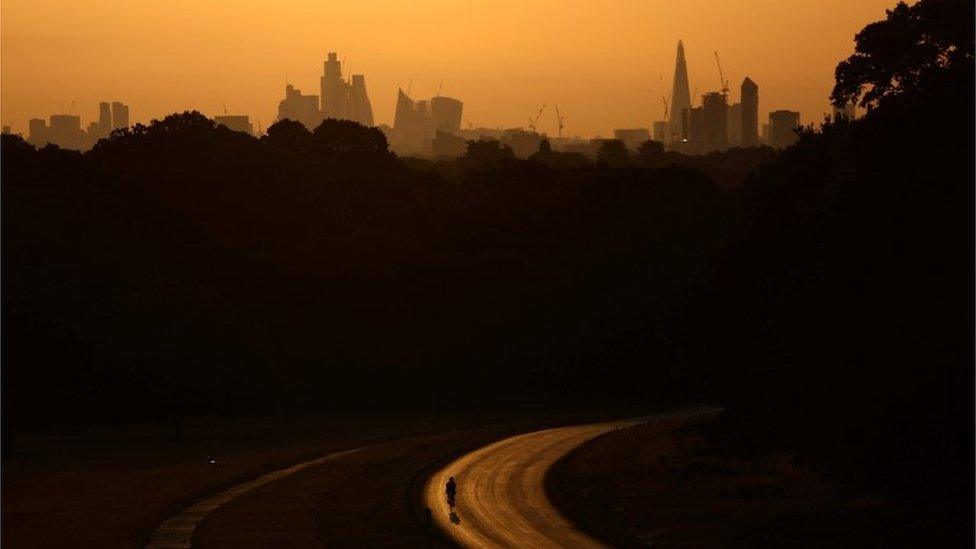
Temperatures could reach 40C on Monday and Tuesday
Andrew Tucker, a water demand reduction officer, told BBC Radio 4's Today programme they were not expecting to introduce restrictions on usage but "that situation might change" if it did not rain much in the coming months.
He urged people not to waste water and said "with everyone playing their bit, we'll get through this".
It comes as 70 firefighters helped to deal with a burst water main on Galsworthy Road in Kingston.
The 30-inch (76cm) water main has now been shut off and the water is receding.
Allow X content?
This article contains content provided by X. We ask for your permission before anything is loaded, as they may be using cookies and other technologies. You may want to read X’s cookie policy, external and privacy policy, external before accepting. To view this content choose ‘accept and continue’.
With it being cooler right now in Kingston, Jamaica, people in London are making use of the capital's many green spaces in the summer sunshine - despite warnings to avoid the heat.
Tom Jarvis, the director of London's Royal Parks, which include Richmond, Greenwich, St James's, Bushy and Regents, has urged visitors to take extra care.
"Over the next few days, the Royal Parks will be on fire watch," he said.
"We are asking that visitors help us reduce this risk by not bringing [disposable] barbecues to the parks, not putting out cigarettes on the ground, and not leaving glass bottles or glasses out in the sun, so as to avoid magnifying the sun's rays and starting a fire."
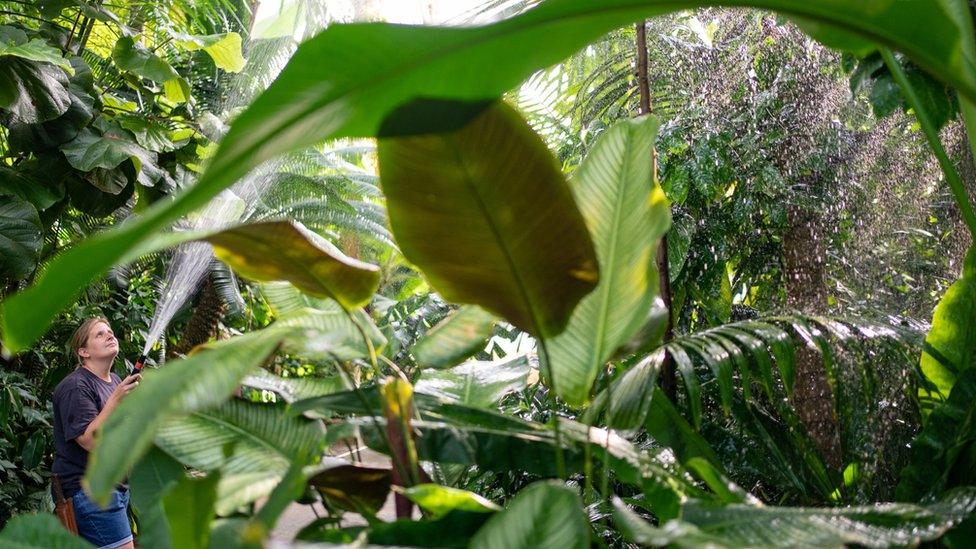
Plants continue to be watered in the Palm House at Royal Botanical Gardens, Kew
At Kew Gardens - which holds the record for the highest temperature in the winter months - the temperature inside the greenhouses is currently cooler than outside them.
On hot dry days, the evaporative cooling effect created by misting the plants in glasshouses can be sufficient to cool the house slightly below external temperatures.

Has your journey been affected? You can get in touch by emailing: haveyoursay@bbc.co.uk, external.
Please include a contact number if you are willing to speak to a BBC journalist. You can also get in touch in the following ways:
WhatsApp: +44 7756 165803, external
Tweet: @BBC_HaveYourSay, external
Or fill out the form below
Please read our terms & conditions and privacy policy
If you are reading this page and can't see the form you will need to visit the mobile version of the BBC website to submit your question or comment or you can email us at HaveYourSay@bbc.co.uk, external. Please include your name, age and location with any submission.

Follow BBC London on Facebook, external, Twitter , externaland Instagram, external. Send your story ideas to hellobbclondon@bbc.co.uk, external
- Published18 July 2022
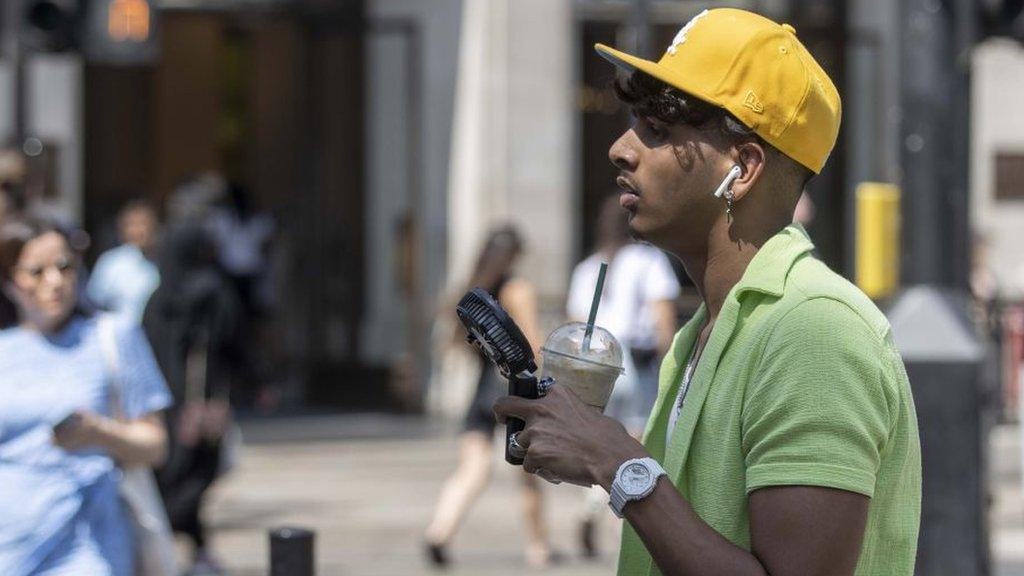
- Published18 July 2022
